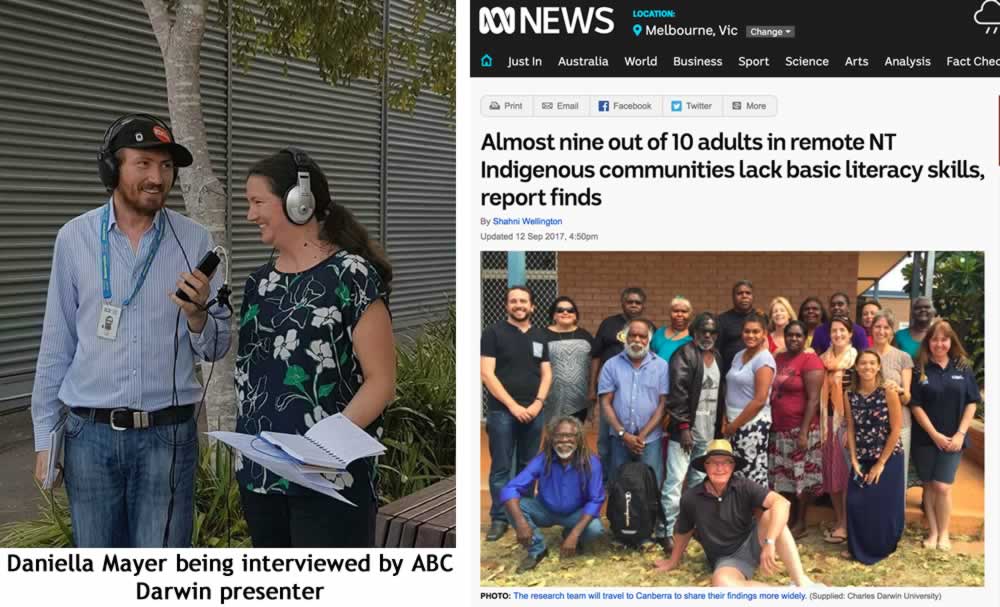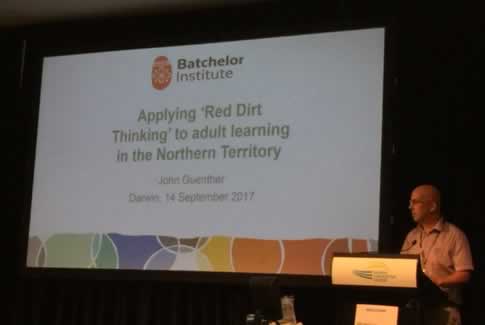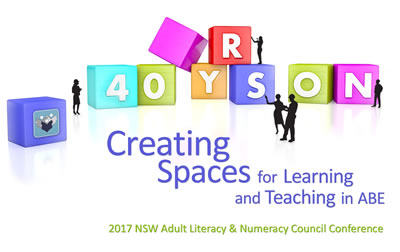October 2017
In this issue
1. From the Co-Presidents
-
New ACAL Committee
-
Thanks
2. Webinar - 'Evidence as a tool for contesting the incontestable assumptions of adult learning policy'
3. Education IRC
-
Embedding the updated TAE Training Package in training practices
-
Updated trainer and assessor credential requirements
-
Review of the Foundation Skills Training Package
4. 'Traders, Neighbours and Intruders: Points of Contact'
-
Conference proceedings
-
ACAL Preconference Symposium reports and papers
5. ACAL on the ABC (broadcaster not alphabet)
-
The people who are trying to teach adults to read- ABC Radio
-
Pre-conference on TV
5. Detailed 2017 Conference Report
6. NSW ALNC Conference 'Creating Spaces for Learning and Teaching in ABE'
-
1 December 2017 Sydney
1. From the Co-Presidents
Many thanks to everyone who joined us online or over the phone for the 2017 ACAL AGM. This was our second online AGM and this year we increased our online connection with the use of webcams. A warm thanks goes out to Dr John Guenther from the Batchelor Institute in the NT who presented a webinar looking at 'Evidence as a tool for contesting the incontestable assumptions of adult learning policy'. This was a wonderful opportunity to reflect on and apply a critical lens to some commonly accepted ideas.
New ACAL Committee
Following the AGM, it is a great pleasure to announce the newly elected ACAL committee:
-
Co-Presidents: Joanne Medlin and Daniella Mayer
-
Honorary Secretary: Vicki Hartman
-
Honorary Treasurer: Lorraine Sushames
State representatives are:
-
Ann Kelly, QCAL
-
Debra Urquhart, NSW ANLC
-
Andrea McMahon, TCAL
-
Michele Sutcliffe, SACAL
-
Rhonda Pelletier, VALBEC
-
Cheryl Wiltshire, WAALC
The ACAL Committee will be working to define the 2017-2018 work plan and welcome suggestions from our wider community to refine this process. Among the priorities we are interested in are:
-
Open discussions around the professional development opportunities and needs of the Adult LLN educator workforce
-
Promotion of literacy and numeracy skills across ages and stages of life within the Australian context
-
Continued lobbying in the workplace language and literacy space
-
Positive change for adult Indigenous language, literacy and numeracy
Thanks
Thank you to the previous ACAL Executive Committee for their engagement and work over the last year; Jenni Anderson, President (retiring); Vicki Hartman, Secretary; Lorraine Sushames, Treasurer; Ann Kelly QCAL Rep; Michele Sutcliffe from SACAL; Pam Osmond, NSWALNC; Anita Planchon of TCAL; Rhonda Pelletier of VALBEC and Cheryl Wiltshire of WAALC. Also thank you to Don MacDowall, ACAL Executive Support.
Thank you to Keiko Yasukawa who has provided ongoing support to the ACAL committee this year. Earlier this year we were thrilled to present lifetime membership to Margaret McHugh in recognition of her involvement and contributions to the organisation.
Daniella Mayer and Jo Medlin, Co-Presidents
2. Webinar - 'Evidence as a tool for contesting the incontestable assumptions of adult learning policy'
 This webinar followed the 2017 AGM in October.
This webinar followed the 2017 AGM in October.
In a political environment where the so called pragmatics of economic policy are used to dismiss any suggestion of alternative purposes for adult learning outside of skills for economic participation, is there any room for an alternative discourse? And if so, on what basis can we argue against the overwhelming imperatives of knowledge for the sake of economic growth?
Dr John Guenther, Research Leader Education and Training, with Batchelor Institute of Indigenous Tertiary Education presented this webinar at the AGM on October 18, 2017.
3. Education IRC
The Education Industry Reference Committee has responsibility for national training package qualifications relevant to Training and Education and Foundation Skills including the TAE Training and Education Training Package and the FSK Foundation Skills Training Package.
The IRC will consult widely during any future training package development process providing opportunity for any interested parties to make a contribution.
The Education IRC is currently supported by the Skills Service Organisation, PWC Skills for Australia.
Please see the extracts of the communique from the first Education IRC meeting of the new IRC. The full communique is available on our website.
Embedding the updated TAE Training Package in training practices
The IRC discussed how RTOs are embedding the updated TAE Training Package in training practices, noting that some concerns have been raised about the Training Package's content being inconsistently interpreted, leading to variations in how training is delivered. The IRC noted the importance of taking care when developing training products to ensure that their content is readily understood and consistently interpreted.
Updated trainer and assessor credential requirements
IRC members considered the recent changes to trainer and assessor credential requirements, including the requirement for all trainers and assessors to hold the units of competency TAEASS502 and TAELLN411 by 1 January 2019. The IRC noted the ongoing need to help the sector embed the update, and to ensure that future reviews of the TAE Training Package consider how to equip the VET workforce with appropriate skills in designing and developing assessment tools and in evaluating learners' LLN requirements.
Review of the Foundation Skills Training Package
The IRC considered draft recommendations for changes to training products in the Foundation Skills Training Package. These recommendations were formed based off industry consultation carried out by PwC's Skills for Australia on behalf of the IRC. The IRC anticipates that a Case for Endorsement for changes to the Foundation Skills Training Package will be submitted to the Australian Industry and Skills Committee in late 2017.
4. 'Traders, Neighbours and Intruders: Points of Contact'

Conference proceedings
Only papers received prior to the start of the conference were included in these proceedings. This is, therefore, just a sample of those presentations on offer. Papers have been published as submitted.
ACAL Preconference Symposium 'English Language, Literacy and Numeracy for Aboriginal adults in the NT'
The lives and livelihoods of all Australians are increasingly impacted by the knowledge economy, with its underpinning requirement for high levels of English language, literacy and numeracy (LLN) skills. For Indigenous Australians, low levels of English LLN continues to seriously limit participation in society, education and the economy. The consequences flow through generations and across all areas of life.
5. ACAL on the ABC (broadcaster not alphabet)

The people who are trying to teach adults to read- ABC Radio
During the conference ABC Radio did some interviews.
One interview was with then Vice-President Daniella Mayer.
Pre-conference on TV
An ABC TV program was about the pre-conference 'English Language, Literacy and Numeracy for Aboriginal adults in the NT'
6. Detailed 2017 Conference Report

 ACAL's 2017 Conference: Traders, Neighbours and Intruders, Points of Contact was held in Darwin at the Darwin Convention Centre, with two associated events - a Pre-Conference Symposium and Research Day being held at the Charles Darwin University Casuarina Campus.
ACAL's 2017 Conference: Traders, Neighbours and Intruders, Points of Contact was held in Darwin at the Darwin Convention Centre, with two associated events - a Pre-Conference Symposium and Research Day being held at the Charles Darwin University Casuarina Campus.
The Conference provided an opportunity to celebrate 40 years of ACAL and to recognise the value and importance of adult literacy and numeracy in Australian contemporary society and to connect with colleagues and friends from across the country and overseas. It attracted practitioners, policy makers, education providers, teachers and researchers, who attended dozens of sessions delivered by passionate presenters.
 This year's Arch Nelson Address, 'To be or not to be … literate: A personal story' by Heather D'Antoine, Menzies School of Health Research in Darwin offered a view of literacy from within an Aboriginal family. Professor Santosh Mehrotra, Professor of Economics and Human Development explored adult literacy in the global south and the potential of technology such as mobile phones to improve access to learning. Professor Melissa Steyn, University of the Witwatersrand, Johannesburg, introduced her Critical Diversity Literacy framework, inviting delegates to consider this topic in relation to their own practice and adult literacy context. Dr John Guenther, Research Leader Education and Training with Batchelor Institute of Indigenous Tertiary Education 'Applying 'Red Dirt Thinking' to adult learning in the Northern Territory' challenged us to think differently about perceptions of adult literacy in remote environments.
This year's Arch Nelson Address, 'To be or not to be … literate: A personal story' by Heather D'Antoine, Menzies School of Health Research in Darwin offered a view of literacy from within an Aboriginal family. Professor Santosh Mehrotra, Professor of Economics and Human Development explored adult literacy in the global south and the potential of technology such as mobile phones to improve access to learning. Professor Melissa Steyn, University of the Witwatersrand, Johannesburg, introduced her Critical Diversity Literacy framework, inviting delegates to consider this topic in relation to their own practice and adult literacy context. Dr John Guenther, Research Leader Education and Training with Batchelor Institute of Indigenous Tertiary Education 'Applying 'Red Dirt Thinking' to adult learning in the Northern Territory' challenged us to think differently about perceptions of adult literacy in remote environments.

The Pre-conference Symposium Action for Change: Indigenous Adult English Language, Literacy and Numeracy attracted considerable interest. Professor Jack Beetson, Executive Director of the Literacy for Life Foundation presented the Keynote Address, focussing on the Foundation's Aboriginal Adult Literacy Campaign.
The Research Forum 'Refreshing the Research Commitment: Adult Language, Literacy and Numeracy (LLN) Research to strengthen collective impact' focussed on its role in renewing alliances and promoting the value of this research nationally.
The series of events attracted nearly 200 people from all the states and territories of Australia, as well as places as widely dispersed as Fiji, the Philippines, New Zealand, India and South Africa.
 Thank you to all presenters for sharing your knowledge, which led to many fruitful discussions on issues and topics that affect our field. Many volunteer hours went into conference planning and preparation, so it was heartening to read such positive remarks in delegate evaluations. Those comments and suggestions are appreciated and we are delighted that people found the conference so informative and worthwhile. A sincere thank you to our sponsors, the organising committee and everyone who worked behind the scenes to stage the events.
Thank you to all presenters for sharing your knowledge, which led to many fruitful discussions on issues and topics that affect our field. Many volunteer hours went into conference planning and preparation, so it was heartening to read such positive remarks in delegate evaluations. Those comments and suggestions are appreciated and we are delighted that people found the conference so informative and worthwhile. A sincere thank you to our sponsors, the organising committee and everyone who worked behind the scenes to stage the events.
If you weren't able to make to Darwin, we hope to see you next year in Melbourne.
Lorraine Sushames, Conference Convenor
Thanks to Louise Wignall, Vicki Hartman and Daniella Mayer for the pics. See more pics on the ACAL Conference website.
7. NSW ALNC Conference 'Creating Spaces for Learning and Teaching in ABE'
1 December 2017 Sydney
 Over the 40 years since the inception of the council, the field has undergone tremendous changes ‒ in name, in philosophical orientation, in the nature and purpose of provision, and in professional status. This conference will be a forum in which participants consider the different spaces in which ABE demands exist, and what participants in the field can do to shape the ways in which the demands could be met.
Over the 40 years since the inception of the council, the field has undergone tremendous changes ‒ in name, in philosophical orientation, in the nature and purpose of provision, and in professional status. This conference will be a forum in which participants consider the different spaces in which ABE demands exist, and what participants in the field can do to shape the ways in which the demands could be met.
We ask: Where are the spaces to debate policy, practice and pedagogy in ABE?
